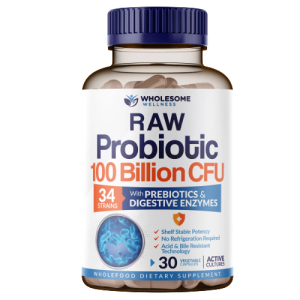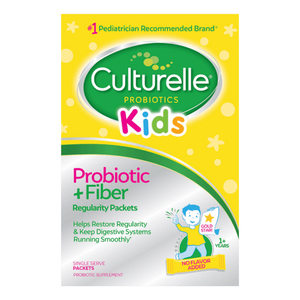 Expert's opinion
Expert's opinion
The article is a subjective view on this topic written by writers specializing in medical writing.
It may reflect on a personal journey surrounding struggles with an illness or medical condition, involve product comparisons, diet considerations, or other health-related opinions.
Although the view is entirely that of the writer, it is based on academic experiences and scientific research they have conducted; it is fact-checked by a team of degreed medical experts, and validated by sources attached to the article.
The numbers in parenthesis (1,2,3) will take you to clickable links to related scientific papers.
Best Probiotic For Constipation 2024: Top 5 Brands Reviews
All articles are produced independently. When you click our links for purchasing products, we earn an affiliate commission. Learn more about how we earn revenue by reading our advertise disclaimer.
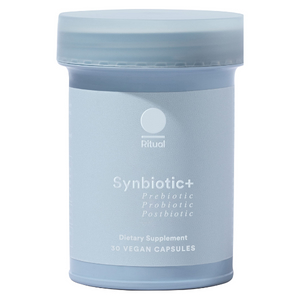
Ritual Synbiotic+
- 3 in 1 prebiotics, probiotics, and postbiotics
- Best probiotics for constipation
- Supports gut balance
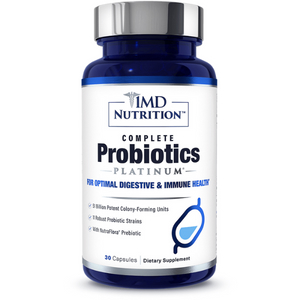
1MD Complete Probiotics Platinum
- Contains 51 billion live Colony forming units (CFU)
- Dairy-free, gluten-free, and soy-free
- Vegetarian safe-to-consume capsules
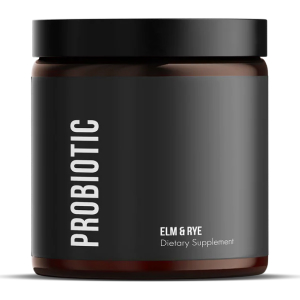
Elm & Rye Daily Probiotic
- Boosts immune system function
- Easy-to-take capsule supplement
- Aids in relieving constipation
Many people in the world experience constipation. In fact, about 16% of the global population[1] experiences issues with digestive health leading to constipation, exhibiting a close relationship to quality of life for individuals. The problem of chronic constipation increases with age.
While treating constipation can be challenging, natural remedies such as probiotics offer relief. The goal is to improve the gut microbiome by increasing the levels of good gut bacteria.
Best Probiotic For Constipation In (April. 2024)
- Ritual Synbiotic 50+ – Editor’s Choice
- 1MD Complete Probiotics Platinum – Best Vegan Probiotic
- Elm & Rye Daily Probiotic – Best for Boosting Immune Function
- Wholesome Wellness Organic Probiotic – Best Probiotic for Adults
- Culturelle Kids Regularity Probiotic & Fiber – Best Probiotic for Kids
5 Best Probiotic For Constipation To Try In 2024
Ritual Synbiotic+
Ritual Synbiotic+ is a 3-in-1 option for people who want to alleviate constipation. It contains a winning blend of Lactobacillus rhamnosus (LGG) and Bifidobacterium animalis ssp. Lactis (BB-12).
- 3 in-1 prebiotics, probiotics, and postbiotics
- Supports gut balance
- Vegan gluten-free and dairy-free probiotic supplement
- Third-party tested
- Expensive than other supplements
- Requires a monthly subscription
Treating constipation requires taking the best probiotic for constipation. Ritual Synbiotic + contains a Probiotic blend of 120 milligrams (mg) containing Lactobacillus rhamnosus (LGG) and Bifidobacterium animalis ssp. Lactis (BB-12). There’s also PreforPro 15 mg, a prebiotic bacteriophage blend, and Tributyrin 300 mg. Bacteriophages are viruses that attack bacterial cells and destroy them. Probiotics are good for increasing short-chain fatty acid levels in the body while balancing the pH in the colon. It’s common to experience occasional constipation and stomach cramps. Lactobacillus rhamnosus (LGG) is a good probiotic bacteria strain[2] that can alleviate constipation.
LGG supplements help individuals with constipation experience stool frequency. This works well with Bifidobacterium animalis ssp. Lactis (BB-12). Bifidobacterium animalis ssp. Lactis (BB-12) can relieve constipation by improving colon transit time.[3]
Occasional constipation is a little easier to treat with fermented foods that help boost gut transit time. But, if you have chronic constipation, it can be a daily matter to handle. The gut microbiome is essential to your overall health, and maintaining a balance there is crucial. There are both good and bad bacteria in the gut microbiota, and to treat constipation, there needs to be a healthy balance between the two.
1MD Nutrition Complete Probiotics
1MD Nutrition Complete Probiotics contains 11 strains of probiotic bacteria and a prebiotic encased in an acid-resistant capsule designed to encourage a balanced gut microbiome and enhanced immune function.
- Contains 51 billion live Colony Forming Units (CFUs)
- Dairy-free, gluten-free, and soy-free
- Vegetarian safe-to-consume, delayed-release capsules
- Has 11 probiotic strains
- Can cause mild bloating
The probiotic blend contains 11 strains of scientifically proven strains of beneficial probiotic bacteria including Lactobacillus acidophilus, Bifidobacterium lactis, Bifidobacterium lungus, Lactobacillus plantarum, Lactobacillus salivarius, Bacillus coagulans, Lactobacillus gasseri, Bifidobacterium bifidum, Lactobacillus rhamnosus, Lactobacillus casei, and Bifidobacterium longum. . The complete probiotic blend is 308 milligrams (mg).
Other ingredients include Rice Hulls, Delayed-release vegetable cellulose capsules, and rice bran.
Taking probiotics can help relieve functional constipation This is the type of constipation that doesn’t have any hormonal or physical causes. It differs from chronic constipation caused by dietary changes and poor hydration.
There are 51 billion CFUs per capsule of 1MD probiotics. You can take these continuously, following the dosage of 1 capsule daily. 1 bottle contains 30 slow-release vegetable cellulose capsules.
The goal is to achieve better gut microbiome balance and to aid digestion.[4] Better food breakdown in the stomach makes it easier to have a regular bowel movement. The stomach-resistant capsule ensures the probiotics get released in the small intestines for maximum relief.
Are you looking for the best probiotic for constipation and weight loss? The 1MD Nutrition Complete Probiotics is a safe product that encourages better digestion and gut health. Weight loss gets hard when you have functional constipation since it slows down your metabolism.[5]
Elm & Rye Daily Probiotic
Elm & Rye Daily Probiotic is a simple-to-take supplement that works to ease constipation. It contains 100 mg of one probiotic strain, Lactobacillus acidophilus, and other inert filler ingredients.
- Boosts immune system function
- Easy-to-take capsule or gummy supplement
- Aids in relieving constipation
- Good for weight loss
- It might lead to mild stomach cramps
Another best probiotic for constipation is the Elm & Rye Daily Probiotic, which comes in capsule or gummy form. The recommendation is to take one capsule or gummy per day, which suits adults. The probiotic supplement contains one probiotic strain that aids in digestion, improves bowel movements, and enhances skin health.
The extra boost in digestion can increase stool frequency which is crucial for a healthy lifestyle.[6] Constipation is often characterized by a drop in bowel movement leading to health issues. But, once you experience good digestion, it improves whole gut transit time. This probiotic is also essential for vaginal health. This is a slow-release capsule that won’t get affected by stomach acid. The goal is to wait until it reaches the small intestines for maximum benefits. You can experience better gut health when you achieve a gut microbiota balance between good and harmful bacteria.
Wholesome Wellness Organic Probiotic
Wholesome Wellness Organic Probiotic contains 34 strains of probiotics to fight bad bacteria. These include Bifidobacterium animalis ssp. Lactis, Lactobacillus rhamnosus, Lactobacillus acidophilus, Bifidobacterium infantis, Bifidobacterium lactis, and many more.
- Shelf-stable probiotic supplement
- Contains 34 strains of beneficial bacteria
- Made in the US in a certified Good Manufacturing Practices (GMP)facility
- Can cause mild stomach cramps
- Causes bloating for the first few days
- Proprietary formulas used
This is a shelf-stable organic probiotic with 34 strains of good bacteria.[7] It contains 100 billion CFUs, an Organic Probiotic fiber blend of 150 mg, a Digestive Enzyme complex of 200 mg, and a Raw Whole Fruit & Veggie blend of 50 mg.
The high-quality probiotic supplement is made from ingredients free from genetically modified organisms (non-GMO) and is clinically proven to aid digestion. Here is a broad-spectrum probiotic with a diverse mix of raw probiotic strains, digestive enzymes, prebiotic fibers, vegetables, and fruits. Taking it can help you experience regular bowel movements and offer relief from constipation.
The digestive enzymes[8] in this probiotic blend aid in food digestion. They enable more efficient breaking down of fats, carbohydrates, and proteins while easing health problems like stomach cramps and diarrhea.
All you need to do is take one capsule a day of the probiotic to keep your gut healthy. The product is suitable for men and women to relieve constipation. Experience better gut transit time by taking the best probiotics for constipation. These probiotics relieve constipation with few side effects.
The raw probiotic contains whole vegetables and fruits that are organically grown and harvested. It benefits the immune system by enhancing nutrient absorption and the production of short-chain fatty acids. A recent 2021 study showed promise in utilizing probiotics alongside other treatments[9] in COVID response regimens, given their success in influenza outbreaks, but further research is needed.
Culturelle Kids Regularity Probiotic & Fiber
Culturelle Kids Regularity Probiotic & Fiber solve digestive issues for kids one year and above. It contains 20 calories of carbohydrates ( 5 grams), dietary fiber 3.5 grams, and Lactobacillus rhamnosus GG 13 grams.
- Contains naturally sourced ingredients
- Offers relief for childhood constipation
- Clinically studied probiotic strain for kids
- Has dietary fiber
- Not suitable to take if there are underlying health problems
As kids grow, diet changes can affect their digestive system as they develop new bowel habits. This is where Culturelle Kids Regularity Probiotic & Fiber comes into play. It ranks among the best probiotics for kids that keep bad bacteria in check.
The best probiotic contains a unique blend of naturally sourced ingredients suitable for kids. It aids the digestive system to run smoothly and contains no additional flavors. This has a clinically tested bacteria strain for kids, 2.5 billion CFUs of Lactobacillus rhamnosus GG.[10]
Taking probiotics helps to ease stomach discomfort for youngsters by balancing gut bacteria. There are also 3.5 grams of dietary fiber made from kiwi fruit in the blend that helps alleviate constipation. This is a non-irritating kids’ blend that improves overall digestion.
The product is suitable for kids above one year. You only need to give them one packet three times a day. Mix the quality probiotic with food such as apple sauce or yogurt. Make sure you stir the food well before feeding it to your kid. Never mix the probiotic supplement with hot food or drinks.
If your child is not used to eating fiber, temporary bloating and gas may occur as the digestive system becomes used to the fiber present in the supplement. A gradual increase in fiber intake is recommended for anyone not used to it.
What Is Constipation?
Constipation is a condition that’s characterized by a reduction in bowel movement. As stool frequency reduces, you can start experiencing abdominal pain and discomfort. Changing diet, stress, and certain health conditions can lead to constipation.
Health conditions characterized by constipation include irritable bowel syndrome (IBS).[11] This disorder affects the digestive system leading to abdominal pain, constipation, and bloating. Probiotic supplements are often suggested to facilitate bowel movements.
Another health condition affecting kids is childhood constipation.[12] Children experience constipation due to many issues, including food allergies, diet changes, and genetics.
Lastly, pregnant mothers can experience constipation for several reasons. This includes changes in physical activity, prenatal supplements, and hormonal changes. Almost 40% of women will experience occasional constipation[13] at one time or another during the pregnancy. It is also more common to experience constipation premenopausal[1] rather than postmenopausal.
Do Probiotics Help With Constipation?
Quality probiotics help constipation by increasing stool frequency, thus providing some relief and comfort. The goal is to enjoy the maximum satisfaction and physical comfort possible by taking probiotic supplements.[14] Probiotics help to promote gut balance by increasing the number of good bacteria thriving in the digestive tract. There’s also an increase in the production of short-chain fatty acids, thus reducing inflammation and fighting off infection. Probiotics promote a rise in bile salt metabolism and balance the colon’s pH. Numerous strains of friendly bacteria relieve constipation by enabling stool frequency[15] and consistency.
Benefits Of Probiotics For Constipation
There are several health benefits of probiotics for constipation. At the top of the list is balancing gut bacteria that improve gut health. The digestive system[9] gets negatively affected by a large presence of bad bacteria. This can lead to issues like leaky gut. However, when you take probiotics for constipation, there’s a balance in gut bacteria.[16]
On top of that, taking probiotics improves bowel movement and helps keep you regular. These are safe to consume daily as long as you don’t experience any adverse side effects. The probiotic strains help with food breakdown in your stomach, preventing constipation.
What Are The Best Probiotics For Constipation?
The best probiotics for constipation must contain traceable natural ingredients that benefit the body.
So, what is the best probiotic for constipation? A good example of such a product is Ritual Synbiotic +. This product contains probiotic strains that increase the number of beneficial bacteria in the gut.
It also supports digestive health while offering constipation relief for adults. The product comes in acid-resistant, easy-to-take capsules that can improve stool consistency.
Probiotics and fiber are good for increasing short-chain fatty acid levels in the body while balancing the pH in the colon. Short-chain fatty acids are good for everything from relieving inflammation to regulating immune function.
It’s common to experience occasional constipation and stomach cramps. Lactobacillus rhamnosus (LGG) is a good probiotic bacteria strain[4] that can alleviate constipation with irritable bowel syndrome (IBS). The product is also the best probiotic for constipation IBS.
How To Choose The Best Probiotics For Constipation?
Always research the manufacturer and product before buying probiotics for constipation ion. The best probiotics for constipation have few valuable ingredients. Also note these probiotic supplements are vegan, meaning gluten-free, dairy-free, and soy-free.
Check for details on third-party testing and whether there are recent reports on potency and quality. Picking the right probiotics for gut health can help with health problems and improve your quality of life.
Final Thought
The best probiotics for constipation are a great remedy for alleviating functional constipation. People experience constipation for numerous reasons. Even kids can experience childhood constipation and need relief.
Taking probiotics has different health benefits that include balance in the gut microbiome and an improvement in immunity. Be sure to purchase probiotics that contain healthy ingredients. Check the label to see the product’s probiotic strains and any available allergen information available.
Frequently Asked Questions
The best type of probiotic for constipation must have the right strains. One of the best probiotic strains is Bifidobacterium longum. The Bifidobacterium strain appears to be the best for constipation relief. Lactobacillus acidophilus, which benefits the digestive system,[17] is also a valuable strain. Probiotics ease constipation by enabling better food breakdown, longer gut transit times, and softer stools.
Probiotics are the best for constipation because they contain the right ingredients to improve digestion. These strains are good for treating constipation by enabling gut balance to ease functional constipation through slowing gut transit and softening stools. Issues like a leaky gut may be resolved with a balance of good and bad bacteria in your gut.
Probiotics help to promote gut balance by increasing the number of good bacteria. There’s also an increase in the production of short-chain fatty acids. Probiotics promote a rise in bile salt metabolism and balance the colon’s pH.
Yes, there are downsides to probiotics. Some ingredients in probiotics can trigger an allergic reaction. Therefore, it’s good to always check out allergy warnings on the pack. In addition, probiotics can cause issues like bloating and mild abdominal pain.
People with underlying health problems must speak with their physician before taking probiotics. Even top-quality probiotics aren’t recommended if you’ve undergone surgery or have problems with your immune system such as a critical illness or autoimmune disorder.
Yes, it’s okay and safe to consume probiotics every day. However, you must follow the recommended dosage and note any side effects. If side effects like bloating and abdominal pain persist, cease using and speak to your physician about an alternative remedy.
+ 17 sources
Health Canal avoids using tertiary references. We have strict sourcing guidelines and rely on peer-reviewed studies, academic researches from medical associations and institutions. To ensure the accuracy of articles in Health Canal, you can read more about the editorial process here
- Mojgan Forootan, Bagheri, N. and Darvishi, M. (2018). Chronic constipation. Medicine, [online] 97(20), pp.e10631–e10631. doi:https://doi.org/10.1097/md.0000000000010631.
- Granata, M., Brandi, G., Borsari, A., Gasbarri, R. and Diana Di Gioia (2012). Synbiotic yogurt consumption by healthy adults and the elderly: the fate of bifidobacteria and LGG probiotic strain. International Journal of Food Sciences and Nutrition, [online] 64(2), pp.162–168. doi:https://doi.org/10.3109/09637486.2012.718742.
- Philippe Marteau, Cuillerier, E., Séverine Méance, Gerhardt, M.-F., Myara, A., Bouvier, M., Bouley, C., Françoise Tondu, Gilles Bommelaer and Grimaud, J.C. (2002). Bifidobacterium animalis strain DN-173 010 shortens the colonic transit time in healthy women: a double-blind, randomized, controlled study. Alimentary Pharmacology & Therapeutics, [online] 16(3), pp.587–593. doi:https://doi.org/10.1046/j.1365-2036.2002.01188.x.
- Hills, R.D., Pontefract, B., Mishcon, H.R., Black, C.A., Sutton, S.C. and Theberge, C.R. (2019). Gut Microbiome: Profound Implications for Diet and Disease. Nutrients, [online] 11(7), pp.1613–1613. doi:https://doi.org/10.3390/nu11071613.
- Rollet, M., Bohn, T., Vahid, F. and NULL AUTHOR_ID (2021). Association between Dietary Factors and Constipation in Adults Living in Luxembourg and Taking Part in the ORISCAV-LUX 2 Survey. Nutrients, [online] 14(1), pp.122–122. doi:https://doi.org/10.3390/nu14010122.
- SanJoaquin, M., Appleby, P.N., Spencer, E.A. and Key, T.J. (2004). Nutrition and lifestyle in relation to bowel movement frequency: a cross-sectional study of 20 630 men and women in EPIC–Oxford. Public Health Nutrition, [online] 7(1), pp.77–83. doi:https://doi.org/10.1079/phn2003522.
- Yu Jie Zhang, Li, S., Gan, R., Zhou, T., Xu, D. and Hua Bin Li (2015). Impacts of Gut Bacteria on Human Health and Diseases. International Journal of Molecular Sciences, [online] 16(12), pp.7493–7519. doi:https://doi.org/10.3390/ijms16047493.
- Ianiro, G., Pecere, S., Giorgio, V., Gasbarrini, A. and Cammarota, G. (2016). Digestive Enzyme Supplementation in Gastrointestinal Diseases. Current Drug Metabolism, [online] 17(2), pp.187–193. doi:https://doi.org/10.2174/138920021702160114150137.
- Shilia Jacob Kurian, Mazhuvancherry Kesavan Unnikrishnan, Sonal Sekhar Miraj, Bagchi, D., Banerjee, M., Reddy, B., Rodrigues, G., Manu, M.K., Kavitha Saravu, Mukhopadhyay, C. and Rao, M. (2021). Probiotics in Prevention and Treatment of COVID-19: Current Perspective and Future Prospects. Archives of Medical Research, [online] 52(6), pp.582–594. doi:https://doi.org/10.1016/j.arcmed.2021.03.002.
- Hojsak, I. (2017). Probiotics in Children: What Is the Evidence? Pediatric Gastroenterology, Hepatology & Nutrition, [online] 20(3), pp.139–139. doi:https://doi.org/10.5223/pghn.2017.20.3.139.
- Brown AC;Valiere A (2023). Probiotics and medical nutrition therapy. Nutrition in clinical care : an official publication of Tufts University, [online] 7(2). Available at: https://pubmed.ncbi.nlm.nih.gov/15481739/.
- Remes, M., Enrique Coss Adame, Ángel, M., Octavio Gómez Escudero, Andrés, M., J.A. Chávez-Barrera, Flora Zárate Mondragón, Ruíz, A., Rafael, G., Antonio, M., Eduardo Cerda Contreras, Carmona, I., Héctor Guerra López and Rodolfo Solana Ortiz (2020). Lactobacillus acidophilus LB: a useful pharmabiotic for the treatment of digestive disorders. Therapeutic Advances in Gastroenterology, [online] 13, p.175628482097120-175628482097120. doi:https://doi.org/10.1177/1756284820971201.
- Saha, L. (2014). Irritable bowel syndrome: Pathogenesis, diagnosis, treatment, and evidence-based medicine. World Journal of Gastroenterology, [online] 20(22), pp.6759–6759. doi:https://doi.org/10.3748/wjg.v20.i22.6759.
- Markowiak‐Kopeć, P. and Katarzyna Śliżewska (2020). The Effect of Probiotics on the Production of Short-Chain Fatty Acids by Human Intestinal Microbiome. Nutrients, [online] 12(4), pp.1107–1107. doi:https://doi.org/10.3390/nu12041107.
- Miller, L.E., Ouwehand, A.C. and Ibarra, A. (2017). Effects of probiotic-containing products on stool frequency and intestinal transit in constipated adults: systematic review and meta-analysis of randomized controlled trials. Annals of Gastroenterology. [online] doi:https://doi.org/10.20524/aog.2017.0192.
- Xinias, I. and Mavroudi, A. (2015). Constipation in Childhood. An update on evaluation and management. Hippokratia, [online] 19(1), pp.11–9. Available at: https://www.ncbi.nlm.nih.gov/pmc/articles/PMC4574579/.
- Trottier, M., Erebara, A. and Bozzo, P. (2012). Treating constipation during pregnancy. Canadian family physician Medecin de famille canadien, [online] 58(8), pp.836–8. Available at: https://www.ncbi.nlm.nih.gov/pmc/articles/PMC3418980/.

